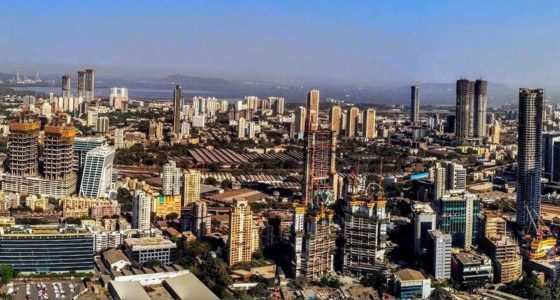· Data center stock likely to double in next 3 years to 23 mn sq ft, from 11 mn sq ft as of August 2023
· Data centers to see investments of USD10 Bn over the next 3 years, a 40% rise from the last three years
· About half of the upcoming supply during 2023-26 to be located in Mumbai, followed by Chennai and Hyderabad
India’s data center stock is likely to double to 23 mn sq ft, translating to a total investment potential of USD10 Billion over the next 3 years across the top 7 cities, according to the Colliers’ latest report “India Data Centers: Entering Quantum Growth Phase”. The report was unveiled at the Second Edition of CII Conference on Tech in Real Estate today at Taj Lands End, Mumbai. Colliers was the Knowledge Partners for the event.
“Significant expansion of the Indian economy by 2047, will be powered by Real Estate. A multifold economic expansion will boost demand across all the asset classes – residential, commercial, warehousing, industrial land developments, etc. – will grow at a multiplier rate to accommodate the growing needs of the economy and consumption needs of the individuals. In recent years, the global real estate sector has witnessed a paradigm shift in its approach to sustainability, with the growing recognition of the Environmental, Social, and Governance (ESG) factors. Environmental, Social, and Governance (ESG) standards have emerged as crucial factors for analyzing the long-term viability and ethical practices of businesses in a variety of industries, including real estate.”, said Dr K Nandakumar, Chairman, CII Maharashtra State Council & Chairman and Managing Director, Chemtrols Industries
Driven by quantum growth in data consumption and cloud adoption, data centers have witnessed significant growth post pandemic with total capacity growing two-fold since 2020. As of August 2023, the data center capacity across the top 7 cities stands at 819 MW, spread across 11.0 million sq feet. Led by exponential increase in data consumption, improving regulatory framework and robust investments in the sector, the data center capacity is likely to double up faster in the next phase of growth, crossing 1,800MW by 2026. With the Digital Personal Data Protection Bill 2023 being passed by both houses of the legislature and set to become a law soon, the Data Center story in India has all the markings to embark on a hitherto unseen success narrative.
Data center stock in India (million sq ft) –
| Year | 2017 | 2020 | 2023* | 2026F |
| Stock (in msf) | 2.7 | 6.2 | 11.0 | 23.0 |
| DC Capacity (in MW) | 188 | 439 | 819 | 1,800 |
Source: Colliers
Data pertains to top 7 cities – Bengaluru, Delhi-NCR, Mumbai, Pune, Hyderabad, Chennai & Kolkata.
Stock represents total IT load capacity including occupied as well as unoccupied space.
*2023 stock is as of August 2023
“Indian data center market propelled by tail winds of digitization, on premise to Colocation shift, data localization and Generative AI demand will see a quantum leap in the construction, delivery and absorption of Data Center space. Data Center as an asset class is proving to be a play with high yield and lower risk once stabilized, with sticky customers which enables patient institutional capital to write larger cheques.” said Ramaiy Kapoor, Managing director, Data Center, Colliers, India
Tier I cities see accelerated growth; Tier II cities likely to see steady ascent
Mumbai continues to remain a relatively matured data center hub, hosting half of the data center capacity of the country. Chennai, Bengaluru and Delhi-NCR are already relatively established markets, while Kolkata remains an emerging hub catering to the zonal data requirements of the region. In the next three years, Mumbai is expected to account for about half of the new additions, owing to the presence of submarine cable connectivity, landing stations and internet exchanges. Along with Mumbai, Chennai and Hyderabad are also likely to witness increased growth owing to strong support infrastructure and encouraging regulatory framework.
While Tier I cities are preferred locations for data center expansion, Tier-II cities are also witnessing steady growth. Currently, Tier-II cities hold only 4% of the total data center capacity in India. However, key data center operators are eyeing multiple cities such as Ahmedabad, Jaipur, Kochi, Nashik, Vijayawada and Bhubaneshwar as potential locations for setting up Edge data centers and as disaster recovery sites. Increased internet penetration, hybrid working, establishment of startups and Technology hubs in these cities will further drive data center growth across these locations in the next phase of growth.
City-wise existing and upcoming data center capacity split –
| City | Existing data center capacity split (% share) | Upcoming data center capacity split (2023-26) |
| Mumbai | 50% | 47% |
| Chennai | 14% | 14% |
| Delhi NCR | 11% | 7% |
| Bengaluru | 10% | 7% |
| Pune | 9% | 5% |
| Hyderabad | 5% | 13% |
| Kolkata | 1% | 1% |
| Multi-city | – | 6% |
| Total DC Capacity (MW) | 819 MW | 981 MW |
Source: Colliers
Existing data center capacity represents total IT load capacity including occupied as well as unoccupied space. Data as of August 2023
Robust Investments fueling Data Center growth
Investors, sparked by data localization efforts in the country and drawn by the prospect of stable income and better yields are capitalizing on the India data center growth story. Since 2020, data centers have received cumulative investments of USD7.0 billion from global data center players real estate developers, and private-equity funds who are looking to expand in India. About 11% of the total investments in data centers since 2020 were in land, and the quantum is expected to rise further in near future, as data center operators continue to scale up their operations across geographies.
A growing recognition of the significance of India’s data centers as lucrative high-yield options is quite evident, especially amongst foreign investors and is expected to gain further momentum in the coming years, as the market grows broader. Since 2020, the sector has received about USD1.1Bn of institutional inflows, 93% of which were from foreign investors.
“India has emerged as a vibrant hotspot for data center expansion amidst increased cloud adoption & digital penetration, robust demand from hyperscalers & relatively lower real estate costs, attracting both domestic and foreign investments. Over the next 3 years, the sector is likely to see USD10 bn of investments, resulting in doubling of the data center capacity to 1800 MW. Interestingly, 30-35% of the total investments will translate into business opportunity for real estate players in the data center space including land and construction.” said Vimal Nadar, Senior Director & Head of Research, Colliers India.
Institutional investments in Data Centers (USD million)
| Year | Investment inflow (USD million) | Share in total investments in alternatives |
| 2019 | 82.0 | 42% |
| 2020 | 235.0 | 65% |
| 2021 | 270.5 | 60% |
| 2022 | 448.7 | 52% |
| YTD 2023* | 72.2 | 46% |
Source: Colliers
Note: *Data is as of September 2023
Note: The institutional flow of funds includes investments by family offices, foreign corporate groups, foreign banks, proprietary books, pension funds, private equity, real estate fund-cum-developers and sovereign wealth funds. The data has been compiled as per the available information in the public domain
Hyperscalers to drive growth of data center space
Global hyperscalers are viewing India as a prime market for expansion to capitalize on the increasing demand from cloud usage. 2023 has seen landmark pre-commitments from global hyperscalers in India’s data center space. As a cost optimisation and revenue–boosting strategy, hyperscalers are looking to build their own Built to Suit (BTS) data center facilities in India. We are likely to witness increasing investments from hyperscalers in the next 3-4 years, who are looking at large scale expansions in India, focusing on long term growth. This is prompting developers to pursue “land banking” strategies, in which they are acquiring land for future projects in markets where development sites are scarce.
Green data center penetration on the rise
Top data center operators are increasingly prioritizing decarbonization of their data center portfolios, committing towards achieving their net zero targets by 2050. Decarbonization offers significant benefits to operators, in terms of enhanced rental premiums, asset valuation, brand recognition and reduced operational costs. As of 2023, only about 20% of the existing data center stock is LEED certified. However, there has been a 61% rise in green data center capacity compared to 2020 levels, as global operators are increasingly investing in low-carbon and energy efficient technologies to reduce the impact on the environment and achieve optimum efficiency.
Since data centers are typically associated with high energy consumption, there is ample room for more sustainable elements to be adopted. Going forward, energy efficiency will play a critical role in data center demand-supply dynamics.
Also Read: Data center stock to double in next 3 years to 20 million sq ft









